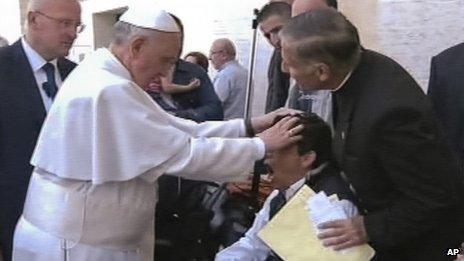Vatican denies Pope Francis performed 'exorcism'
- Published

The young man opened his mouth as the Pope laid his hands on his head, then convulsed and slumped in his wheelchair
The Vatican has denied claims that Pope Francis performed an exorcism, after TV images showed a man apparently reacting to him putting his hands on his head.
The encounter - during Sunday Mass - was shown on a TV channel owned by the Italian bishops' conference.
The station quoted exorcists as saying there was "no doubt" the Pope had either performed an exorcism or a prayer to free the man from the devil.
Its director later apologised for "having altered the truth".
The Pope's spokesman said he "did not intend to perform any exorcism".
"Rather as he frequently does with the sick or suffering who come his way, he simply intended to pray for a suffering person," said Federico Lombardi in a statement, external.
The footage shows a young man, who is in a wheelchair, opening his mouth and either screaming or breathing deeply as the Pope puts his hands on his head and prays for him during the Mass in St Peter's Square.
The man then convulses and slumps in his chair.
On Tuesday, the director of the TV station which broadcast the pictures, TV 2000, apologised for the report, saying: "I don't want to attribute to him a gesture that he didn't intend to perform."
"I apologise for having altered the truth of the facts and for the people who are involved, in particular I apologise to the Holy Father," said Dino Boffo.
Religious figures in Rome had insisted the act had been an exorcism.
They included the Vatican's former chief exorcist, Gabriele Amorth, who was quoted by Italian media as saying the act "was an exorcism alright" and that he had since performed his own exorcism on the young man, who he said was called Angelo.
Exorcism is the ancient practice of driving out demons or evil spirits from a person or place they are thought to possess. It is practised by some Roman Catholics but treated with deep scepticism by others.